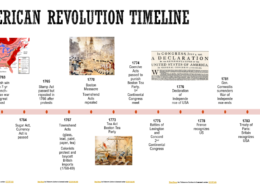Issues like taxation without representation and colonial grievances were significant contributors to the outbreak of the American Revolution: Taxation Without Representation: The British government imposed taxes on the colonies (e.g., Stamp Act, Townshend Acts) without providing them representationRead more
Issues like taxation without representation and colonial grievances were significant contributors to the outbreak of the American Revolution:
- Taxation Without Representation:
- The British government imposed taxes on the colonies (e.g., Stamp Act, Townshend Acts) without providing them representation in the British Parliament.
- Colonists believed this violated their rights as Englishmen, leading to widespread protest and the rallying cry, “No taxation without representation.”
- Economic Burdens:
- Various taxes and trade restrictions harmed colonial businesses and economies.
- Acts like the Navigation Acts and the Tea Act created economic hardships and resentment towards British control.
- Political Autonomy:
- Colonists desired more control over their own governance and resented British interference in colonial affairs.
- The dissolution of local legislatures and imposition of British-appointed governors fueled anger and demands for self-governance.
- Violent Clashes:
- Incidents like the Boston Massacre and confrontations at Lexington and Concord highlighted the escalating tensions and contributed to the willingness to take up arms against British forces.
- Intellectual Movement:
- Enlightenment ideas emphasized individual rights and questioned absolute authority, influencing colonial leaders and intellectuals.
- Writings and speeches by figures like Thomas Paine, John Adams, and Patrick Henry spread revolutionary ideas and mobilized public opinion.
- Punitive Measures:
- British responses to colonial protests, such as the Intolerable Acts, further united the colonies against perceived tyranny.
- These measures included closing Boston Harbor and revoking Massachusetts’ charter, seen as collective punishment for resistance.
Together, these issues created a sense of injustice and a desire for independence, ultimately leading to the American Revolution.
See less

The Declaration of Independence, adopted on July 4, 1776, played a pivotal role in shaping both the American Revolution and subsequent history: Moral and Philosophical Foundation: The Declaration articulated the principles of natural rights and self-government, asserting that governments derive theiRead more
The Declaration of Independence, adopted on July 4, 1776, played a pivotal role in shaping both the American Revolution and subsequent history:
In essence, the Declaration of Independence not only declared the United States’ separation from Britain but also laid the groundwork for the nation’s democratic principles and its role as a beacon of freedom and equality in the world.
See less